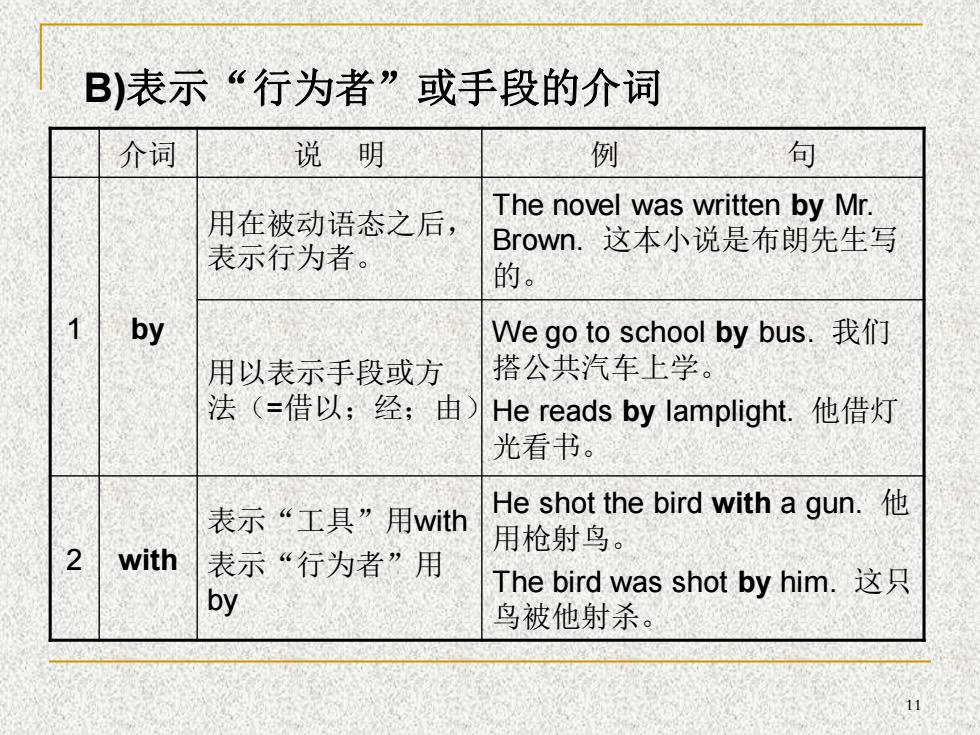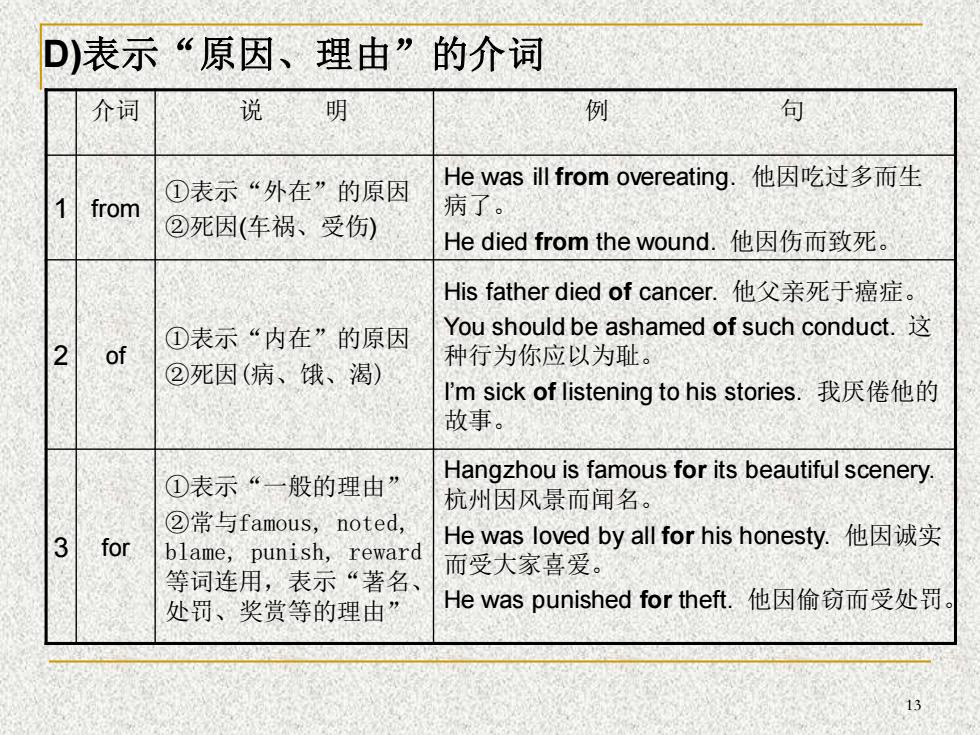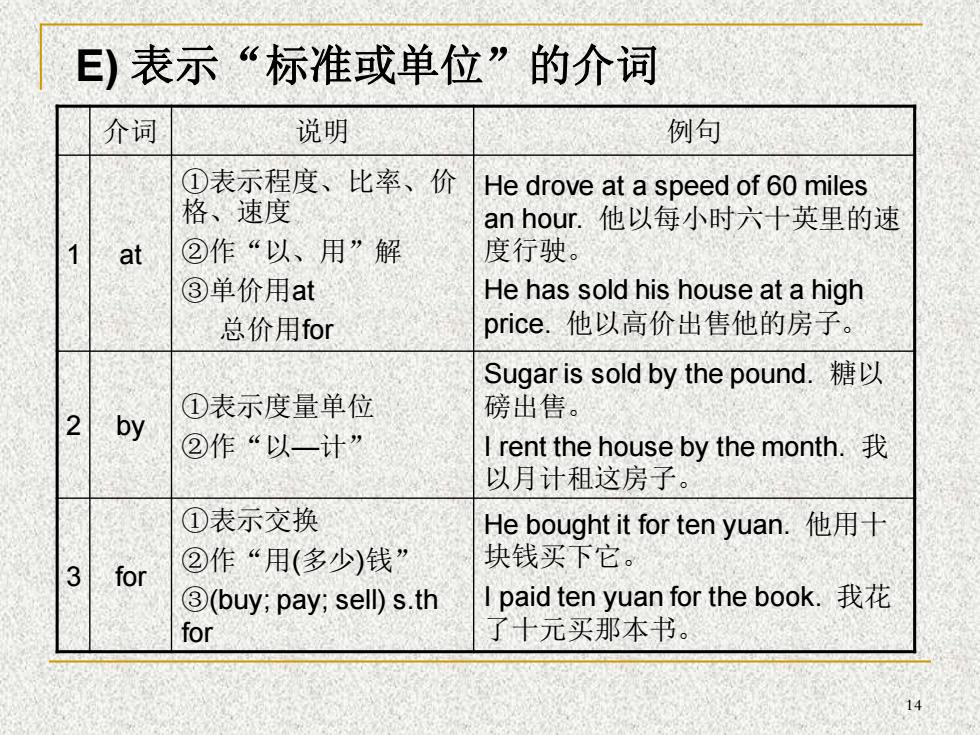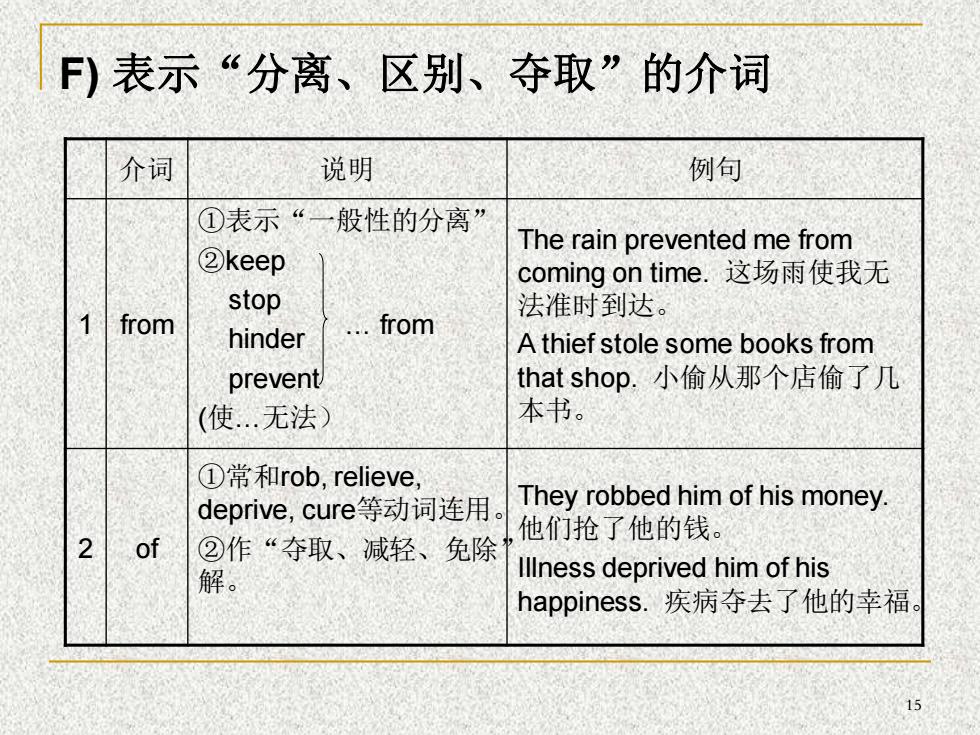
B)表示“行为者”或手段的介词 介词 说明 例 句 用在被动语态之后, The novel was written by Mr. 表示行为者。 Brown.这本小说是布朗先生写 的。 1 by Ve go to school by bus.我们 用以表示手段或方 搭公共汽车上学 法(=借以:经;由) He reads by lamplight.他借灯 光看书。 表示“工具”用with He shot the bird with a gun. 用枪射鸟。 2 with 表示 “行为者”用 The bird was shot by him. by 鸟被他射杀
11 B)表示“行为者”或手段的介词 介词 说 明 例 句 1 by 用在被动语态之后, 表示行为者。 The novel was written by Mr. Brown. 这本小说是布朗先生写 的。 用以表示手段或方 法(=借以;经;由) We go to school by bus. 我们 搭公共汽车上学。 He reads by lamplight. 他借灯 光看书。 2 with 表示“工具”用with 表示“行为者”用 by He shot the bird with a gun. 他 用枪射鸟。 The bird was shot by him. 这只 鸟被他射杀

C)表示“材料”的介词 介词 说明 例 句 The desk is made of wood. 1 of 用于成品与材料 的性质不变时 这桌子是由木材制成的。 2 from 用于成品与材料 Wine is made from grapes 的性质己变时 酒是由葡萄酿制的。 ①与write, You must write letters in ink speak,answer 你必须用墨水写信。 3 in 等动词通用; Can you answer it in English? ②做“用”解 你会用英语回答吗?
12 C) 表示“材料”的介词 介词 说 明 例 句 1 of 用于成品与材料 的性质不变时 The desk is made of wood. 这桌子是由木材制成的。 2 from 用于成品与材料 的性质已变时 Wine is made from grapes. 酒是由葡萄酿制的。 3 in ①与write, speak, answer 等动词通用; ②做“用”解 You must write letters in ink. 你必须用墨水写信。 Can you answer it in English? 你会用英语回答吗?

D)表示“原因、理由”的介词 介词 说 明 例 句 He was ill from overeating.他因吃过多而生 1 ①表示“外在”的原因 from 病了。 ②死因(车祸、受伤) He died from the wound.他因伤而致死。 His father died of cancer.他父亲死于癌症。 You should be ashamed of such conduct. 2 ①表示“内在”的原因 of ②死因(病、饿、渴) 种行为你应以为耻。 'm sick of listening to his stories.我厌倦他的 故事。 ①表示“一般的理由” Hangzhou is famous for its beautiful scenery. 杭州因风景而闻名。 ②常与famous,noted, 3 for blame,punish,reward He was loved by all for his honesty.他因诚实 而受大家喜爱。 等词连用,表示“著名、 处罚、奖赏等的理由” He was punished for theft.他因偷窃而受处罚
13 D)表示“原因、理由”的介词 介词 说 明 例 句 1 from ①表示“外在”的原因 ②死因(车祸、受伤) He was ill from overeating. 他因吃过多而生 病了。 He died from the wound. 他因伤而致死。 2 of ①表示“内在”的原因 ②死因(病、饿、渴) His father died of cancer. 他父亲死于癌症。 You should be ashamed of such conduct. 这 种行为你应以为耻。 I’m sick of listening to his stories. 我厌倦他的 故事。 3 for ①表示“一般的理由” ②常与famous, noted, blame, punish, reward 等词连用,表示“著名、 处罚、奖赏等的理由” Hangzhou is famous for its beautiful scenery. 杭州因风景而闻名。 He was loved by all for his honesty. 他因诚实 而受大家喜爱。 He was punished for theft. 他因偷窃而受处罚

E)表示“标准或单位”的介词 介词 说明 例句 ①表示程度、比率、价 He drove at a speed of 60 miles 格、速度 an hour..他以每小时六十英里的速 1 at ②作“以、用”解 度行驶。 ③单价用at He has sold his house at a high 总价用for price.他以高价出售他的房子。 Sugar is sold by the pound.糖以 ①表示度量单位 2 磅出售。 by ②作“以一计” I rent the house by the month. 以月计租这房子。 ①表示交换 He bought it for ten yuan..他用十 块钱买下它。 3 for ②作“用(多少)钱” ③buy;pay;sel)s.th I paid ten yuan for the book.我花 for 了十元买那本书
14 E) 表示“标准或单位”的介词 介词 说明 例句 1 at ①表示程度、比率、价 格、速度 ②作“以、用”解 ③单价用at 总价用for He drove at a speed of 60 miles an hour. 他以每小时六十英里的速 度行驶。 He has sold his house at a high price. 他以高价出售他的房子。 2 by ①表示度量单位 ②作“以—计” Sugar is sold by the pound. 糖以 磅出售。 I rent the house by the month. 我 以月计租这房子。 3 for ①表示交换 ②作“用(多少)钱” ③(buy; pay; sell) s.th for He bought it for ten yuan. 他用十 块钱买下它。 I paid ten yuan for the book. 我花 了十元买那本书

F)表示“分离、区别、夺取”的介词 介词 说明 例句 ①表示“一般性的分离” The rain prevented me from ②keep coming on time.这场雨使我无 stop 1 法准时到达。 from hinder from A thief stole some books from prevent that shop.小偷从那个店偷了几 (使.无法) 本书。 ①常和rob,relieve, deprive,.cure等动词连用。 They robbed him of his money. 他们抢了他的钱 2 of ②作“夺取、减轻、免除 解。 Illness deprived him of his happiness.疾病夺去了他的幸福
15 F) 表示“分离、区别、夺取”的介词 介词 说明 例句 1 from ①表示“一般性的分离” ②keep stop hinder prevent (使…无法) The rain prevented me from coming on time. 这场雨使我无 法准时到达。 A thief stole some books from that shop. 小偷从那个店偷了几 本书。 2 of ①常和rob, relieve, deprive, cure等动词连用。 ②作“夺取、减轻、免除” 解。 They robbed him of his money. 他们抢了他的钱。 Illness deprived him of his happiness. 疾病夺去了他的幸福。 … from